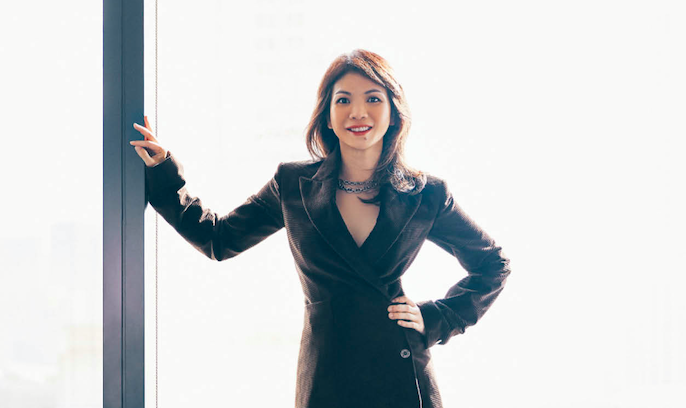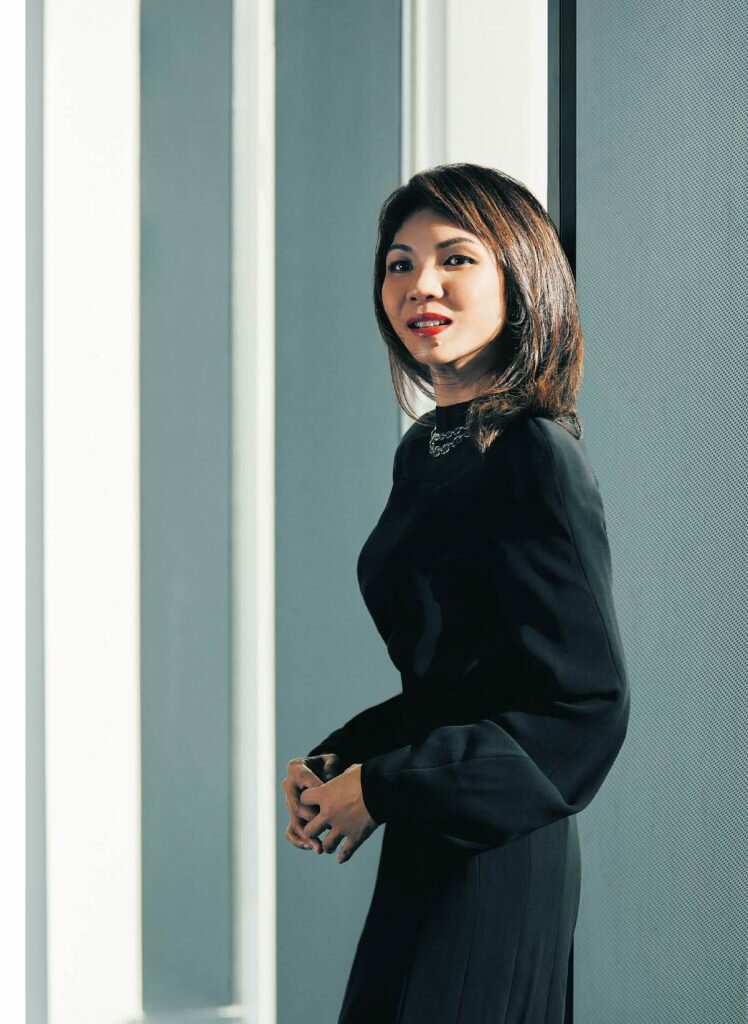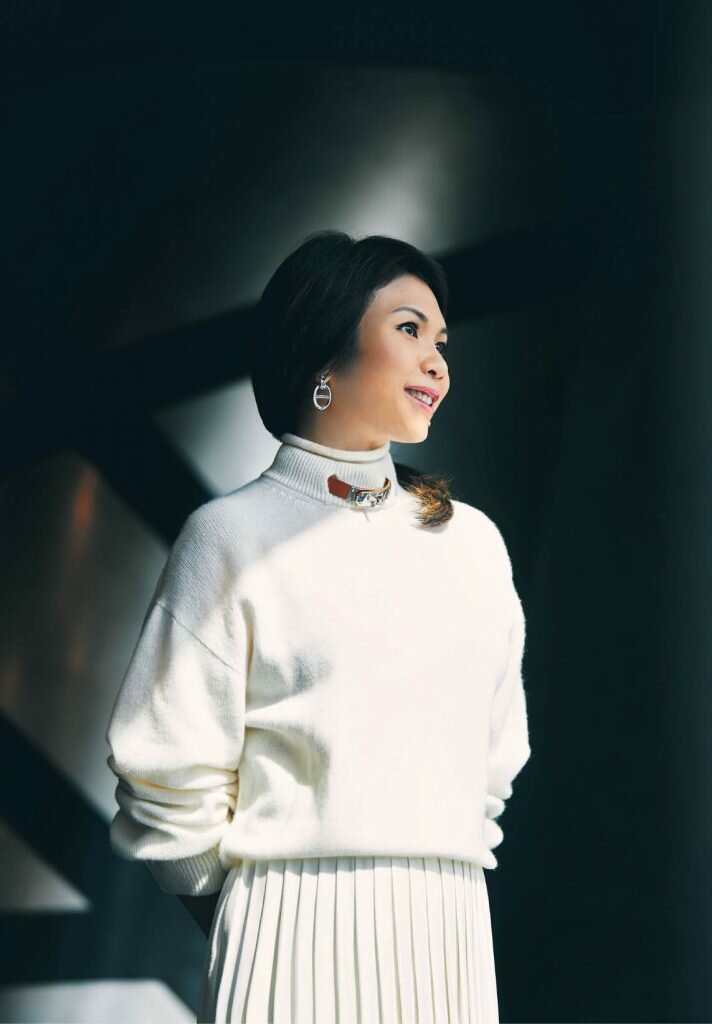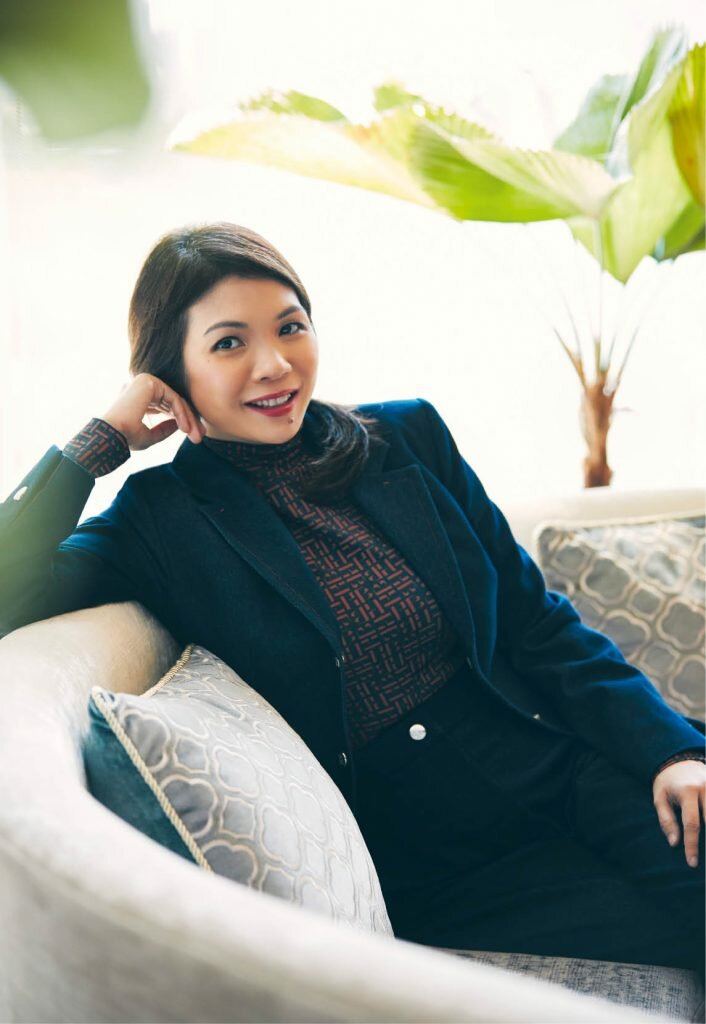It’s almost trite to point out that visionaries and entrepreneurs are born with it, that ineffable, undefinable quality that make people sit up and pay attention, and to say: “Okay, you have my attention. Show me what you’ve got.” You can’t hothouse it into existence. So, you can’t create it at will. And you certainly can’t teach it.
Even if you’ve just met Shirley Crystal Chua, it’s immediately obvious that she has that it quality. You sense it the minute she walks into a room — physically diminutive but radiating a calmness of purpose, an outsized intelligence and a killer instinct. You also get the sense that with one gestalt glance around the room, she has already taken a measure of everyone in it, assessed their capabilities and worked out what problems need to be solved, and how she will solve them.
It all happens in an eye-blink and later, much later, when you’re no longer in the direct line of her gaze — she has that rare ability to look you in the eye and give you her full attention, even when a stylist is orbiting her and applying makeup and hairspray for this issue’s cover photo — you realise how it’s no accident that in eight short years, she has created a formidable collection of multi-family office, fintech, consulting, fund management and workspace businesses.
Through her Singapore-based holding company, Golden Equator, Chua manages, seven companies — including multi-family office Golden Equator Wealth and venture capital arm Golden Equator Ventures, which invests in high-growth technology firms — and, at last count in early 2020, more than $600m worth of assets overall. Besides regional offices in Cambodia and Taiwan, the group also expanded its footprint into Brunei early this year, establishing its multi-family office business, consulting arm and potentially its workspace subsidiary in the oil-rich sultanate.
A quick glance at the websites of her companies shows that all the buzzwords du jour are present and accounted for — synergistic network, ecosystem, unique investment opportunities, digital transformation, visionaries of tomorrow, propel human potential, delivering value, optimising, transformation.
What comes out less clearly, and this only happens when you meet Chua in person, is just how serious she is about what she’s doing. And how committed she is to changing the status quo for the better, and to doing better.
She’s particularly interested in the next generation. To the extent that she created a company, The Simple Sum, that harnesses intuitive multimedia content to improve their financial literacy, and Nugget, to teach them fiscal fundamentals including budgeting and credit. Even her tent pole Golden Equator Wealth — which advises ultra- high net-worth families on wealth and legacy preservation — incorporates an arm that specifically coaches young scions in wealth management and growth. “The earlier these life skills are learnt,” she says, “the more long-term relevance they have.”
Of course, this forward-looking interest finds its fullest expression in Chua’s investments in early-stage businesses and start-ups. “I find the entrepreneurial journey so fascinating, because it reminds me of my own journey,” she says, obliquely referring to her late entry into the sphere after over a decade at Citibank and American Express. “When you’re starting out, you have to juggle 10 things at once — finance, digital, hiring, sourcing investors, digital analysis…”
And, as she’s pointed out in the past, she didn’t come from a rich family that could nurture her entrepreneurial instincts. Everything she has achieved has been through uncompromising graft and single-minded focus. “The idea of helping young entrepreneurs was a key motivational factor in starting a consulting arm to the business.”
This is why, even in these difficult Covid-laced times, she’s still paying it forward and earning huge kudos along the way. Taizo Son, whom Chua once impulsively collared at a start-up event, is a big fan. The maverick Japanese billionaire investor was so impressed by her that not only did he come onboard Golden Equator as a special advisor, he moved his ecosystem-driven venture firm into Spectrum, the Golden Equator company at Duo Tower anchored by a 28,000-sq-ft co-working space — including an in-house speakeasy bar lined with around 500 whiskey labels, because that’s just how Chua rolls.
What’s 2020 been like for you?
A lot of things were put on hold because of the difficult circumstances we found ourselves in. Also, if you’d talked to me last year [2019], I would have had a very different mindset to the one I have now.
It’s been a year of solitude and reflection, and it’s brought me a lot of clarity, especially about how the business should grow. Golden Equator is now eight years old. We’re at an adolescent stage — we’re neither a start-up nor an established business. And this is when changes need to happen. I mean, a company should look very different today to how it did eight years ago, right?
How did you achieve that clarity?
For me, it came from solitude. During the Covid-19 lockdown, I took up running again. I was able to do a lot of thinking.
So what became clearer?
That I need to have the courage and confidence to execute my plans to create a better business. And so, this year, I started to shift limited resources around to optimise and focus on and grow key areas like human resources. I needed to weed out areas that were distracting noise. I needed to make difficult but good decisions that would bring positive prospects, especially to the people who’ve been with me on this journey.
Where did that courage and confidence come from?
It came from remembering why I wanted to be an entrepreneur in the first place, of my key purpose. Which is to have a positive impact on businesses and people. To be a good leader and bring hope. But I have to stress that clarity doesn’t necessarily equate to courage. That comes from remembering your purpose.
Those are lofty goals.
I’m a CHIJ girl and this past year, our school motto kept ringing through my head: Simple in Virtue, Steadfast in Duty. And I kept thinking about how I needed to serve and improve the world.
You speak about creating better businesses and positive prospects. What are some examples?
I’m interested in not just high-net-worth individuals, but also your everyday retail investor. When I was much younger, I didn’t know how to manage my finances and I’ve come to realise that the earlier I can teach young people these life skills, the more long-term relevance they have. Nugget is a new app platform that helps young people learn how to manage their funds, achieve credit, understand financial concepts, build a financial profile, budget and even how to invest extra resources.
Skill sets that are amplified by technology and enhanced by learning, as you say.
Yes. Golden Equator Wealth [which provides ultra-high- net-worth families with wealth and legacy preservation solutions] has an 18-24 month programme for the nextgens to work with us as paid employees, where they learn across the ecosystem of investments, entrepreneurship, start-ups, private companies, creativity and digital.
What does it mean to be a female leader?
When you talk about Facebook, you think of Mark Zuckerberg. Tesla, Elon Musk. Amazon, Jeff Bezos. You think of a person. But when you think of Golden Equator, you think of a company when really, the word association should be more Golden Equator/Shirley Crystal Chua, because I make most of the key final decisions. Golden Equator should be tied more to me. It’s me. I know that, but I’ve yet to translate that internal knowledge more explicitly to the company’s external representation.
That’s an interesting perspective.
I’ll tell you something else. In each of the businesses that I’ve created, I’ve put in a lot of resources, but I’ve also realised that along the way, I’ve given away or shared a lot of the credit. As a young female founder from a conservative Asian background, I lacked confidence [in the beginning]. It seemed so impossible that I had achieved all this. “It’s not just me,” I would think.
And that’s changed?
I make most of the calls, so I need to take responsibility and ownership. For both the failures and the successes.
Do you think this is a perspective that’s unique to women?
Women are living in our best time in terms of influence, getting attention and receiving resources. The breaking of glass ceilings and #metoo started in the West through its media and leaders, and it’s spilled over to the East.
I’m seeing an acceleration in female leadership. In my field of venture capital and private equity, it takes a lot of strength to hold your own. But you still get cases where some people don’t know their boundaries, so you have to teach young women how to deal with these situations and to share their experiences. How do we teach them to be safe, even as we guide them?
What’s your forecast for the next five years?
I really like fintech and Covid-driven biotech wellness. I also think 5G is very important for sector and generation drivers. The world’s prosperity depends on speed. This means more robots and tech. Low latency is key.
How will humans keep up?
AI will help reduce and simplify huge volumes of information into important bits and pieces. For sure, changes in technology will disrupt our employability. Which means our collective mindsets will need to change. Going back to craftsmanship will be important in that sense. And we will also need to train senior management to make better decisions.
What about sustainability?
That’s a very buzzy word but I worry that people don’t understand it in enough detail. Sustainability is not just about the physical space. And if you’re a policymaker, you need to plan 10, 20 years in advance to start educating and to shift skill sets.
The word “community” comes up quite often with you.
Our corporate motto is “The future, together”. I think people understand the benefits of community. Early on, the question for us was whether we should create a wider community or just stay within the one we were in. Creating a community requires deliberate effort. With Spectrum, we have a shared office space with a community element. It’s how we work, live and play together. We karaoke together. We even have a speakeasy bar that caters to groups of decision makers who like to hang out with other decision makers.
What is this wider community?
It’s a spectrum. On one end, we have investors, legal, corporate secretarial for whom we create programming to connect with government agencies. And then we have enablers, which are people like PR agencies and digital experience networks who help amplify an existing business. With each of these communities are other communities, and collectively, they create an ecosystem.
Looking ahead to 2021…
We need to emphasise excellence. We need to be ready for change. We need to be like a well-oiled F1 team and win races. We need to be fast and agile. We have to be able to change all four tyres of the race car in four seconds, which means we have no time for bureaucracy. We need to solve problems in the shortest time, in the most effective way. And it’s not just about the driver. Sure, he’s a crucial element, but it’s equally important to build up the team. It takes a village to win.
Stand and fall together.
And it’s okay to make mistakes. Mistakes happen when you’re being curious, when you innovate. If you’re scared of mistakes, you’ll never dare to try new things. You cannot stifle innovation.
This feature first appeared as the cover story of A Magazine’s December 2020 issue.



